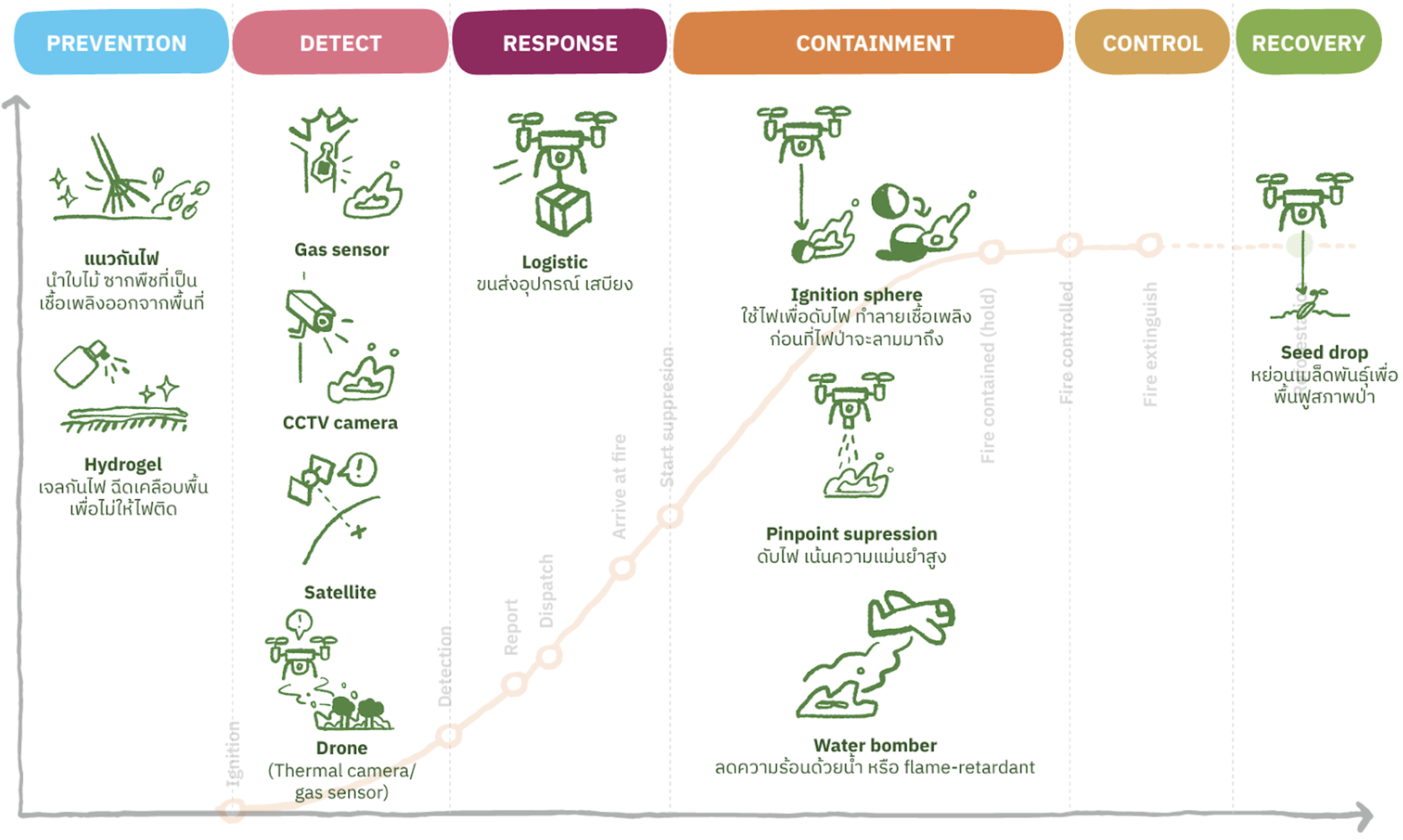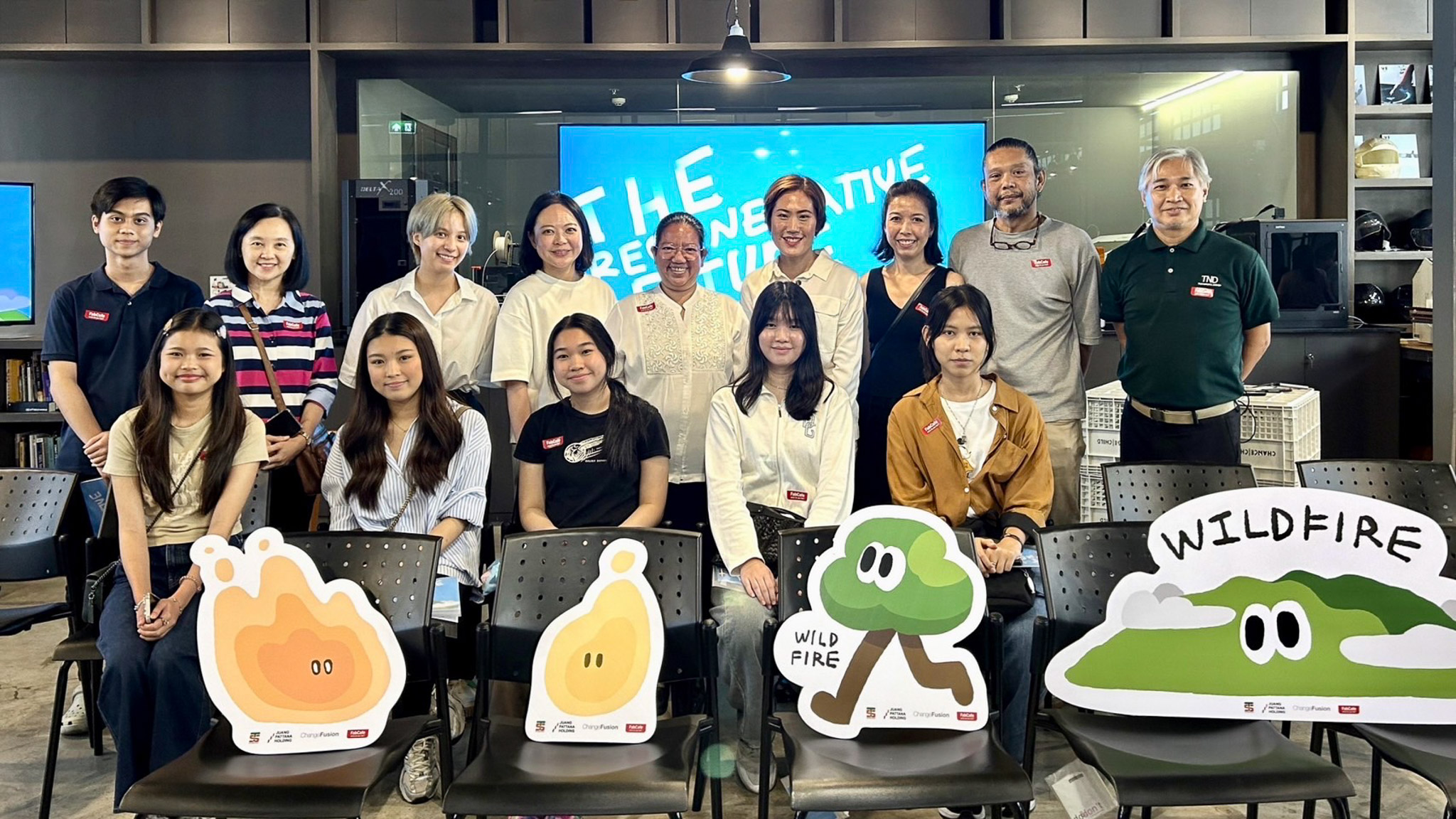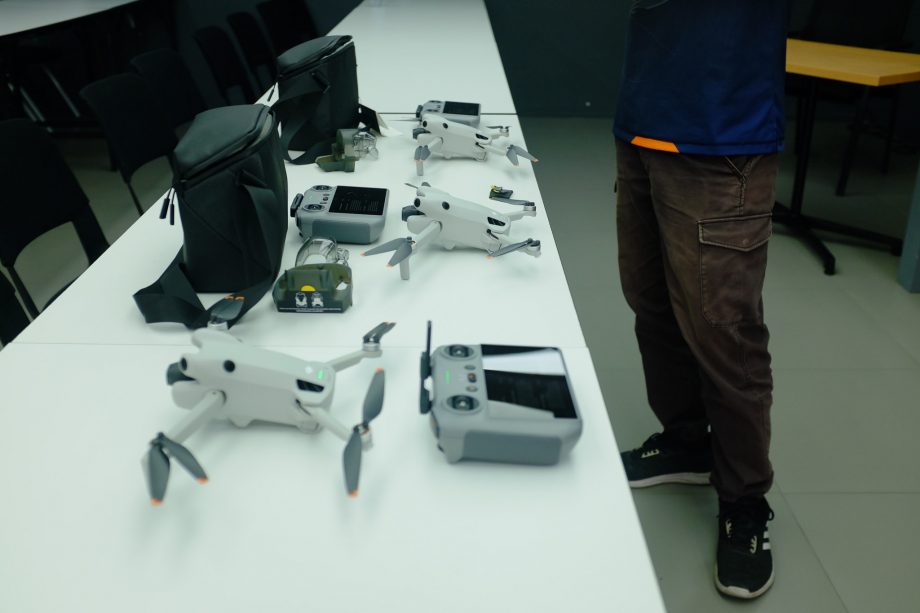Project Case
June 9, 2024
FabCafe Global Editorial Team
Forest fires run rampant in Northern Thailand each year during the dry season, creating an increasingly dire environmental crisis.

The terms “wildfire” and “forest fire” refer to unwanted, unplanned, and unpredictable fires in areas of combustible vegetation. Most of these fires are ignited either intentionally or accidentally by human activities, such as slash-and-burn agriculture or mismanaged campfires. Rising temperatures and droughts due to climate change exacerbate and spread these fires further.
Despite efforts to combat wildfires, they continue to persist and grow increasingly common not just in Thailand but worldwide. One of the key regions affected is the mountainous area of Chiang Mai province, which is annually choked by smog and poor air quality due to the fires. This has led to growing health issues and significant challenges for local residents.
The province of Chiang Mai, covering approximately 20,000 square kilometers, reportedly has a small number of people managing the area and its frequent forest fires, all while working within a very limited budget. Therefore, finding new ways to use technology to prevent, contain, and recover from forest fires is paramount.

There are currently a wide variety of efforts made against wildfires. Each strategy correlates to a specific phase of wildfire response.
Wildfires are recognized as a major global problem amidst the ongoing climate crisis. Due to this, several key response phases have been identified and established: prevention, detection, response, containment, control, and recovery.
Most efforts to combat forest fires — and what people typically focus on when thinking of ways to address them — are aimed at the containment and control stages. In contrast, this edition of THE REGENERATIVE FUTURE program, aptly titled WILDFIRE, seeks to give Thai students a broader perspective by instead focusing on the prevention, detection, response, and recovery phases.

THE REGENERATIVE FUTURE program, a collaborative effort by FabCafe Bangkok, Thai Summit, The Next Forest, and ChangeFusion, aims to educate and empower the next generation on pressing environmental issues such as climate change. This pioneering initiative goes beyond raising awareness by actively involving participants in developing sustainable ideas. The inaugural 2024 edition, titled WILDFIRE, focused on addressing the prevalent threat of wildfires in Northern Thailand, providing participants with firsthand experience and the opportunity to create physical, actionable solutions.
Students in the program engaged directly with various stakeholders significantly affected by wildfires, including the Chiang Mai city governor, local National Park officials, tribal communities, and local residents. These interactions allowed participants to gain crucial firsthand knowledge and insights for developing effective solutions. Participants also received specialized training with technology such as drones made by DJI and rapid prototyping machines.
The ultimate goal of WILDFIRE is to transform knowledge and technology into powerful instruments for combating wildfires and other current environmental challenges, all while fostering collaboration and exchange of expertise.

THE REGENERATIVE FUTURE project operates under the belief that empowering young minds with knowledge, skills, and hands-on experience is essential for driving sustainable innovations and fostering a culture of environmental stewardship. This initiative aims to cultivate a sense of responsibility and creativity among the youth, ensuring they are well-equipped to address the complexities of climate change and ecological degradation, ultimately driving bottom-up change for a more sustainable and resilient future.

A total of 35 Thai students, who each excel in robotics, sustainability, and social entrepreneurship, were hand-selected to participate in WILDFIRE at FabCafe Bangkok.
Large-scale environmental issues like wildfires often seem far out of reach to young students, who may feel unable to make an impact or even fully grasp the situation. By providing them with the opportunity to leverage their skills to turn their ideas into tangible prototypes, the program was able to give them a platform to make a real impact. This experience was designed to inspire them to continue creating sustainable solutions for ongoing environmental challenges even after the program ends.

The inaugural WILDFIRE program of THE REGENERATIVE FUTURE officially began on March 30th, 2024, and ran until June 2nd, 2024. The program was developed to allow students to gain experience in various cutting-edge disciplines and to develop a better understanding of the environmental issues facing Northern Thailand.
Students first participated in an Open House class, where they learned about wildfires and the efforts being made to combat them. After learning about the situation in Chiang Mai, most students ultimately had the same questions: why do these fires keep happening, and why aren’t we doing more to stop them?

A speaker from Chiang Mai University spoke with the students about the importance of restoring local forests.
To give students an in-depth understanding of the situation and possible solutions, the program started with a camp session in Chiang Mai, allowing them to learn firsthand about the problem and interview local stakeholders directly. Students stayed in forest lodging for the three-day session. Throughout the camp, they listened to speakers discuss regulations, local issues, current solutions, and other factors related to the wildfire problem in the region.

During the camp, students stayed at accommodation in Doi Suthep National Park. They could see how smog chokes the air every year in the mountains near Chiang Mai due to the wildfires in the region.
Speakers included a government representative who explained the regulations and current governmental efforts in the region, as well as a representative from Chiang Mai University who works closely with tribes who live in the local forests. These tribes cooperate with not just each other but also government officials to prevent fires by creating and maintaining their own fire lines.


Students went into the forest with a local guide and learned about the effect the wildfires are having on the locals’ daily lives.
To grasp the present situation, students visited several locations in the forested mountains and Doi Suthep National Park. This included the rural Mae Sa Mai community, a small Hmong village in Northern Thailand, where they learned firsthand about local efforts to restore the forest after wildfires occur and how they sustain community-maintained firebreaks.

Through learning about ongoing efforts to combat, monitor, and restore the land after wildfires, the students were able to consider novel and effective while keeping the various stakeholders in mind.
Students also gained insights from the head of Doi Suthep National Park, who spoke about the complexities of forest fire management and the collaborative approaches required to address them effectively. The group then traveled to the village of Khun Chang Khian, where they visited more firebreak areas and listened to locals discuss community issues resulting from the wildfires.
Following the camp, students participated in various workshops aimed at enhancing their technological skills in fields such as drone technology and digital fabrication. Throughout the program, students worked continuously on developing prototypes to combat wildfires in Northern Thailand. They were also required to meet weekly with assigned mentors to refine their ideas into feasible solutions and ultimately functional prototypes.
A pivotal learning experience for the students was receiving firsthand instruction and guidance from DJI, a globally recognized technology company known for its advancements in drone technology. Handling and piloting drones themselves enabled students to envision more vividly the potential applications of drones in firefighting.


Students received instruction from DJI experts in drone technology and how drones can potentially be used in various scenarios. They then built and tested their firefighting drone prototypes at FabCafe Bangkok.
After learning from DJI about drone technology, the students went back to FabCafe Bangkok and got to work building their drone prototypes. Students ideated ways to adapt drones to serve a range of purposes in the fight against wildfires while remaining an accessible tool for the locals fighting the fires and then built the actual prototypes themselves.

THE REGENERATIVE FUTURE program focused heavily on having the students create feasible, solution-oriented technological prototypes. In line with this, the program went a step further, asking students to imagine ways to fund the creation of firelines, since one of the main firefighting challenges in local communities was a lack of budget.

One of the potential ways students identified to raise funds for firefighting in Northern Thailand was making and selling Kombucha using local ingredients.
Although many of the students excel in robotics and technology, this program presented a new opportunity for several: hands-on prototyping. Few students had had the opportunity to apply their skills to come up with unique, pertinent, and effective solutions before participating in WILDFIRE. By the end, the students had designed and created their own prototype firefighting drones.
Following periods of ideation and testing, the students presented their prototypes directly to frontline responders and stakeholders.

Interested in THE REGENERATIVE FUTURE project and how you can contribute?
Join us and get in touch!
The WILDFIRE edition of the program ran from April until June 2024. THE REGENERATIVE FUTURE will continue in future iterations. If you are interested in getting involved, the team at FabCafe Bangkok is actively looking to collaborate with change-makers, creators, and people interested in supporting this project and helping them bring the students’ prototypes to life!
A top-down approach is not the only way to create solutions for a social or environmental problem. FabCafe Bangkok aims to take a bottom-up approach in its projects and enact real change on the ground. If you’re interested in collaborating with us and taking the next step to change the situation, or if you have any questions, please get in contact through the FabCafe Bangkok Facebook inbox or through email at kalaya@fabcafe.com. Join us in creating innovative, sustainable, grassroots solutions.
The WILDFIRE edition of THE REGENERATIVE FUTURE PROGRAM was organized by FabCafe Bangkok in collaboration with Thai Summit, Next Forest, and ChangeFusion.
-
Kalaya Kovidvisith
FabCafe Bangkok Co-founder
Kalaya Kovidvisith is Co-founder of FabCafe Bangkok and Managing Director of FABLAB Thailand. She holds Master degree in Design and Computation from Massachusetts Institute of Technology (MIT). Her research interests focus on how digital fabrication and biotechnology reinforce the changing relationship in industry and create the new business model for the next design generation. Kalaya is Global Entrepreneur Summit Delegate of 2015 and Asia Pacific Weeks Berlin 2016.
Kalaya Kovidvisith is Co-founder of FabCafe Bangkok and Managing Director of FABLAB Thailand. She holds Master degree in Design and Computation from Massachusetts Institute of Technology (MIT). Her research interests focus on how digital fabrication and biotechnology reinforce the changing relationship in industry and create the new business model for the next design generation. Kalaya is Global Entrepreneur Summit Delegate of 2015 and Asia Pacific Weeks Berlin 2016.
-
FabCafe Global Editorial Team
This articles is edited by FabCafe Global.
Please feel free to share your thoughts and opinions on this article with us.
→ Contact usThis articles is edited by FabCafe Global.
Please feel free to share your thoughts and opinions on this article with us.
→ Contact us


